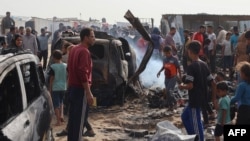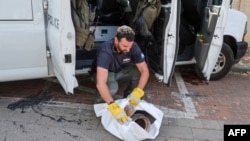The U.N. agency for Palestinian refugees described the situation in Gaza as “hell on earth” Monday following an Israeli attack in the southern city of Rafah that Palestinian health officials say killed at least 35 people.
“Information coming out of Rafah about further attacks on families seeking shelter is horrifying,” UNRWA said. “There are reports of mass casualties including children and women among those killed.”
Israel’s military said it was reviewing an incident in Rafah following reports that an Israeli attack Sunday that it says killed two senior Hamas officials also set off a fire.
The Gaza health ministry said the attack ignited tents in an area sheltering displaced people, and that in addition to the dead there were also dozens of people injured.
The Israeli military described its attack as a precise airstrike that killed Yassin Rabia, the Hamas chief of staff for the West Bank.
Qatar’s foreign ministry said Monday the attack could complicate efforts to mediate a cease-fire and the return of hostages held in Gaza.
European Union foreign policy chief Josep Borrell cited the attack and said Monday the international community faces the dilemma of how it can “enforce implementation” of last week’s International Court of Justice order calling on Israel to immediately halt its offensive in Rafah.
The ICJ is a branch of the United Nations but has no mechanism to enforce its orders.
Israeli Prime Minister Benjamin Netanyahu has vowed Israel will not leave Gaza until any remaining Hamas control of the territory is ended. He says Israel must take over Rafah to eliminate Hamas’s battalions there and achieve its goal of “total victory” over the militants, who have recently regrouped in other parts of Gaza where the Israeli military had previously taken control.
Hamas said Sunday it launched a “large rocket barrage” targeting Israel’s commercial hub of Tel Aviv.
Air raid sirens blared during the attack, but Israel said there were no immediate reports of casualties or damage. It was the first long-range rocket attack from Gaza since January, although rockets and mortar rounds have been fired at Israel from along the Gaza border since then. In the latest attack, rocket launches could be heard from central Gaza.
Hamas’ Izzedine al-Qassam Brigades said in a post on Telegram that it had targeted Tel Aviv “with a large rocket barrage in response to the Zionist massacres against civilians.”
The Israeli military said eight projectiles crossed into Israel after being launched from near Rafah, where Israeli forces recently launched an incursion. Israel said “a number” of the projectiles were intercepted.
Humanitarian aid
U.N. Secretary-General Antonio Guterres welcomed the passage of humanitarian aid and fuel through the Kerem Shalom crossing, while stressing the need for civilians to be protected and their needs for access to food, water and shelter to be met.
“With the humanitarian operation near collapse, the Secretary-General emphasizes that the Israeli authorities must facilitate the safe pickup and delivery of humanitarian supplies from Egypt entering Kerem Shalom to those in need,” Guterres spokesperson Stéphane Dujarric said in a statement.
The aid trucks crossed into Gaza from southern Israel through a new agreement to bypass the Rafah crossing with Egypt after Israeli forces seized the Palestinian side of it earlier this month.
Egypt has refused to reopen its side of the Rafah crossing until control of the Gaza side is handed back to the Palestinians. It agreed to temporarily divert traffic through Israel’s Kerem Shalom crossing, Gaza’s main cargo terminal, after a call between U.S. President Joe Biden and Egyptian President Abdel Fattah el-Sissi.
That crossing has been largely inaccessible because of fighting linked to Israel’s offensive in the nearby city of Rafah. Israel says it has allowed hundreds of trucks to enter, but United Nations agencies say it is usually too dangerous to retrieve the aid on the other side.
The Israel-Hamas war was triggered by the Oct. 7 Hamas attack on Israel that killed 1,200 people according to Israeli officials and led to the capture of about 250 hostages. Israel’s subsequent counteroffensive has killed nearly 36,000 Palestinians, a death toll that includes both civilians and combatants, according to Gaza’s health ministry.
Some material in this report came from The Associated Press, Agence France-Presse and Reuters.




